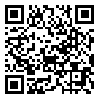Volume 3, Issue 2 (Spring 2015-- 2015)
PCP 2015, 3(2): 107-112 |
Back to browse issues page
Download citation:
BibTeX | RIS | EndNote | Medlars | ProCite | Reference Manager | RefWorks
Send citation to:



BibTeX | RIS | EndNote | Medlars | ProCite | Reference Manager | RefWorks
Send citation to:
Alavinezhad R, Mousavi M, Boojari S. Sleep Problems and Aggressive Behavior in Children with ADHD. PCP 2015; 3 (2) :107-112
URL: http://jpcp.uswr.ac.ir/article-1-241-en.html
URL: http://jpcp.uswr.ac.ir/article-1-241-en.html
1- Department of Psychology, University of Applied Science and Technology, Shiraz, Iran. , raminalavinezhad@yahoo.com
2- Department of Psychology, University of Applied Science and Technology, Shiraz, Iran.
3- Organization
2- Department of Psychology, University of Applied Science and Technology, Shiraz, Iran.
3- Organization
Abstract: (6958 Views)
Objective: Aggression is a disruptive behavior that limits children’s ability for a better adjustment. As commonly reported, sleep problems is associated with the presentation of aggression in ADHD children. In this study, we aimed to investigate the association between sleep problems and aggressive behavior in children with ADHD.
Methods: The study method is correlational and cross-sectional. The study population consists of children that were diagnosed with ADHD for the first time in Shiraz (south of Iran). Fifty eight children (41 boys, 17 girls) clinically diagnosed with Attention Deficit-Hyperactivity Disorder, by a child and adolescence psychiatrist, participated in this study. They were enrolled by accessible sampling. Their ages ranged from 6 to 13 years (mean age=8.06 years, SD= 1.59). None of The children were Medicaid recipients and participated in our study before beginning their medical treatment. Child Behavior Checklist (CBCL) and Children’s Sleep Habits Questionnaire (CSHQ) were used for data collection. For data analysis descriptive statistics, significance tests, Pearson correlation coefficient, independent samples t-test and regression analyses, were used.
Results: Children with ADHD showed a high prevalence of sleep problems, a significantly higher rate that reported before. Needing parent in room to sleep’ (56.9%) was the most prevalent problem. With regard to Sleep habits, sleep duration was age-related (F=17.58, P<0.001). Correlations between sleep problems and aggression were significant. Parasomnias wake-up time, daytime sleepiness and sleep duration were main predictors of aggressive behavior in children with ADHD and accounted for 56% of variance of aggression. No significant gender differences in sleep habits were observed.
Conclusions: As aggressive behavior is a frequently reported problem in patients with ADHD, the results of the study may present a basis for effective diagnosis and treatment planning.
Type of Study: Original Research Article |
Subject:
Cognitive behavioral
Received: 2014/07/23 | Accepted: 2014/12/28 | Published: 2015/04/1
Received: 2014/07/23 | Accepted: 2014/12/28 | Published: 2015/04/1
| Rights and permissions | |
 |
This work is licensed under a Creative Commons Attribution-NonCommercial 4.0 International License. |





